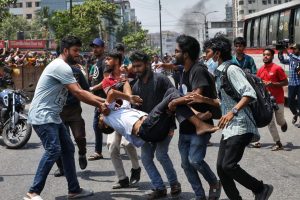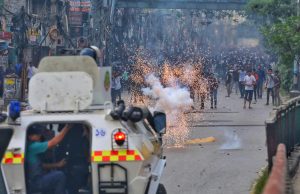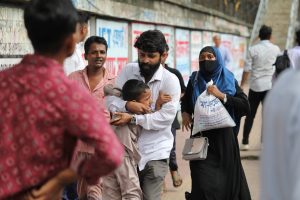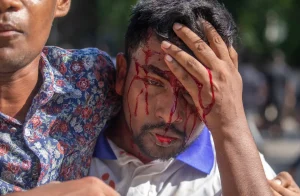In the Midst of Unrest, Calls for Immediate Action to End Violence Against Students in Bangladesh
July 17, 2024 – Bangladesh is currently experiencing a wave of protests and violent clashes centered around the Quota Reform Movement. The movement, driven by students and teachers from both public and private universities, is calling for the end of the quota-based recruitment system in government jobs. These protests, which began in response to a controversial High Court verdict, have escalated dramatically, resulting in injuries and fatalities among protesters.
A Nation in Turmoil
The movement, often referred to as the Bangla Blockade by protesters, began following a June 5, 2024, High Court verdict that declared the 2018 government circular cancelling the 30% quota for descendants of freedom fighters illegal. This decision reignited calls for reform, with students demanding an end to the existing quota system, fair representation for minority groups and disabled individuals, and a new law capping quotas at 5% of total government jobs.
Escalation and Violence
Initially peaceful, the protests resumed with vigor after the Eid-ul-Adha and summer holidays, spreading nationwide under the banner of the newly-formed Boishommobirodhee Chhatro Andolon (Anti-discrimination Students’ Movement). However, the situation turned violent on July 11, when police clashed with students, and further escalated following Prime Minister Sheikh Hasina’s controversial statements on July 14, which labeled protesting students as descendants of Razakars (traitors in the 1971 Liberation War).
The violence peaked on July 16, when members of the Chhatra League, the student wing of the ruling Awami League, attacked student protesters. Notable incidents included an armed assault on Jahangirnagar University students, resulting in injuries to over 50 protesters and two journalists. In Rangpur, a Begum Rokeya University student, Abu Sayed, succumbed to gunshot wounds after police opened fire on demonstrators.
Emergency Response Needed
The recent surge in violence has led to a nationwide outcry for immediate action. Students and activists are calling for an end to the brutality and for the government to address their demands for quota reform. The indefinite closure of schools, colleges, and universities, along with the postponement of exams, has only added to the chaos.
Casualties and Human Rights Concerns
As of July 16, six fatalities have been reported due to the violent crackdown on protesters. Over 600 students and civilians have been injured in clashes with police and Chhatra League members. The deaths of individuals such as Md. Shahjahan, Sabuj Ali, Faisal Ahmed Shanto, Md Wasim Akram, and Abu Sayed have heightened tensions, with protesters honoring them as martyrs of the movement.
International and Domestic Reactions
The violence has drawn condemnation from various quarters. Internationally, the United States Department of State and Amnesty International have called for an end to the violence and urged the Bangladeshi government to ensure the safety of peaceful protesters. Domestically, the opposition Nationalist Party and Left Democratic Alliance have denounced the actions of the Chhatra League and the government’s provocative stance.
Thirty eminent citizens and non-governmental organizations, including Transparency International Bangladesh, have also voiced their concerns over the loss of lives and the suppression of peaceful protests.
Urgent Call for Peace and Justice
In light of these events, there is an urgent need for the Bangladeshi government to engage in dialogue with the protesters, address their demands, and put an end to the violent suppression of dissent. The international community and human rights organizations must continue to monitor the situation closely and advocate for the protection of the rights of students and activists.
As Bangladesh navigates this tumultuous period, the call for justice and reform remains louder than ever. It is imperative that the violence stops, and a peaceful resolution is found to ensure the safety and rights of all citizens.

![Members of the law and order forces are dragging a protesting student to a prison van in Dhaka University campus. 17 July 2024. [Mo: Hasan/BannerNews]](https://quotamovementbangladesh.com/wp-content/uploads/2024/07/451589530_895770185899721_5798050850837410177_n.jpg)


![Members of the law and order forces are dragging a protesting student to a prison van in Dhaka University campus. 17 July 2024. [Mo: Hasan/BannerNews]](https://quotamovementbangladesh.com/wp-content/uploads/2024/07/451589530_895770185899721_5798050850837410177_n-300x200.jpg)


Leave a Reply